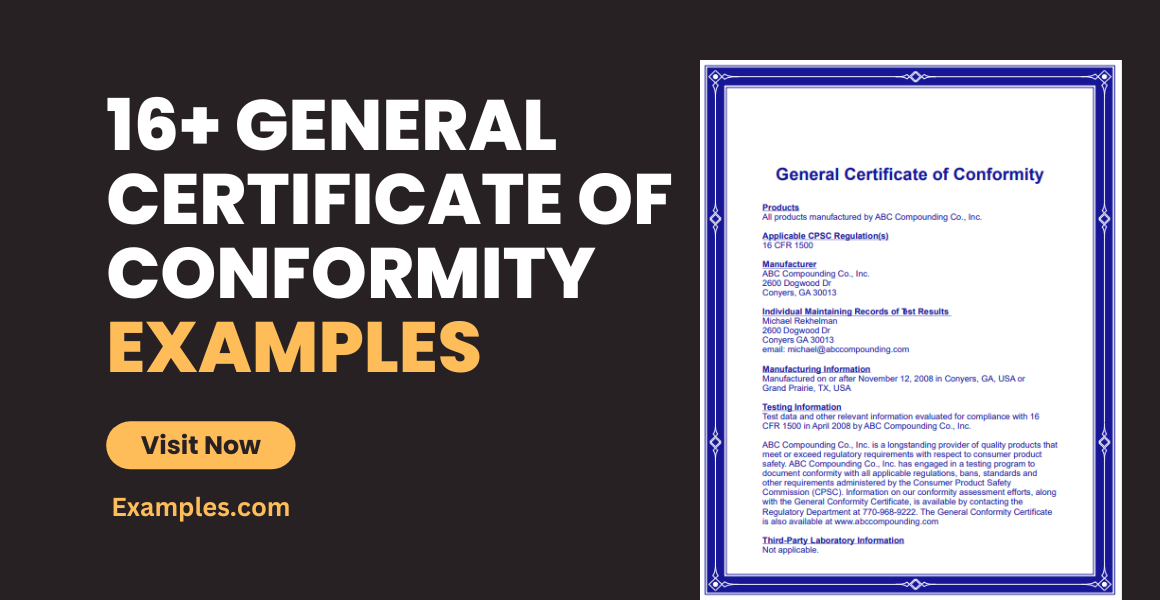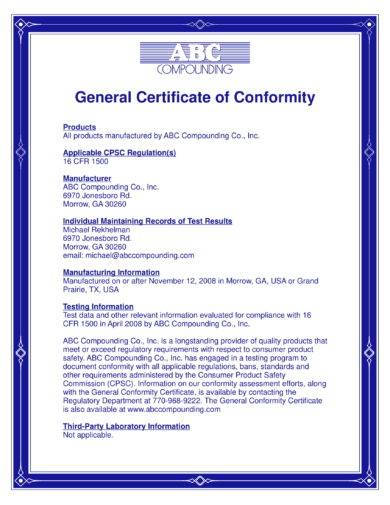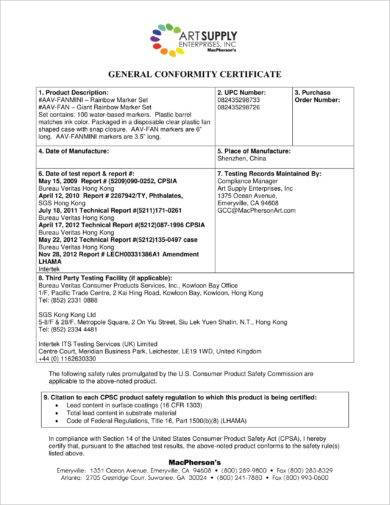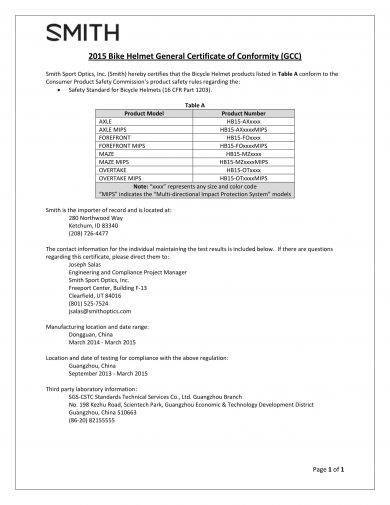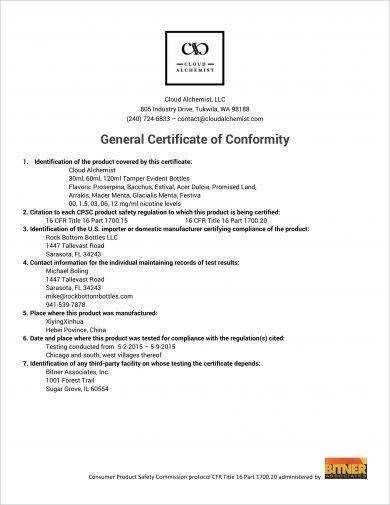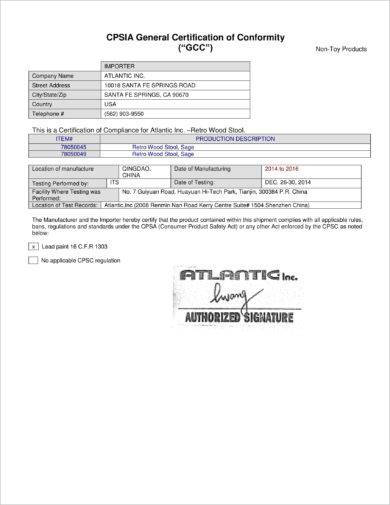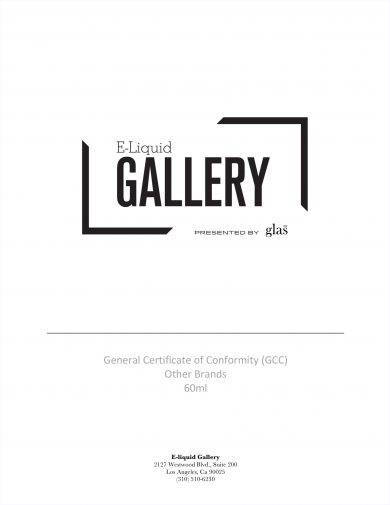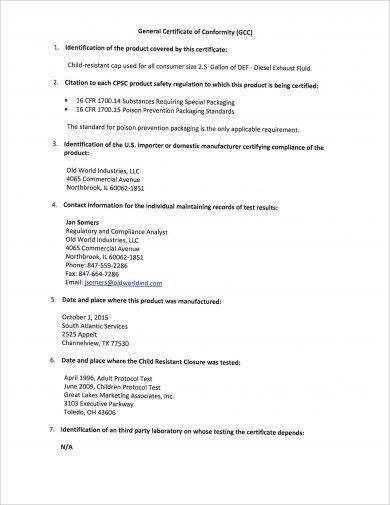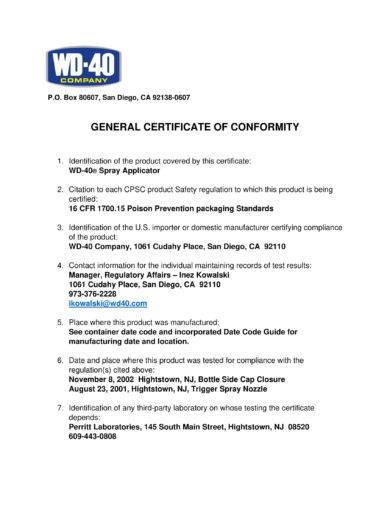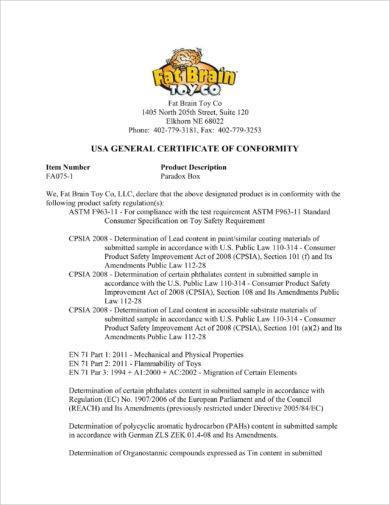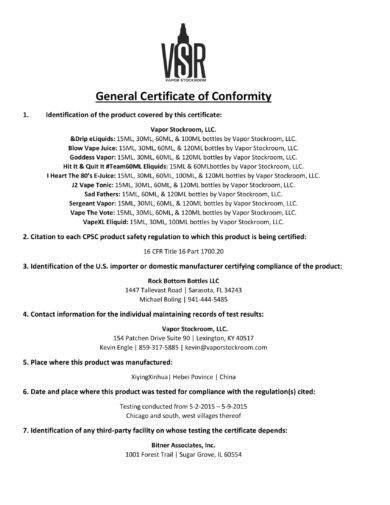16+ General Certificate of Conformity Examples
In buying products, especially those that are imported, we must ensure that the source or the seller and the products are safe and reliable for unsafe and unreliable imported products may result in injury, damage to property, or worse, death. Hence, a lot of countries around the world have strict and rigorous requirements to ensure that the buyers are protected from sub-standard products. You may also see examples of certificate of authorization.
For many decades, they have relied on Intertek, a multinational inspection, product testing, and certification company, to issue them a certificate of conformity and to have pre-shipment inspections to ensure that their products pass the standard and comply with the importing country’s requirements. Further discussion will be presented in the succeeding sections of this article. You may also like modern certificate examples.
Here are several examples of General Certificate of Conformity that you might find useful.
Simple Conformity Certificate Example
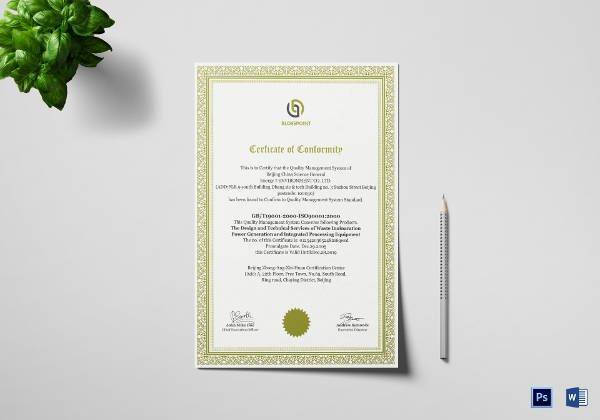
Conformity Certificate Example
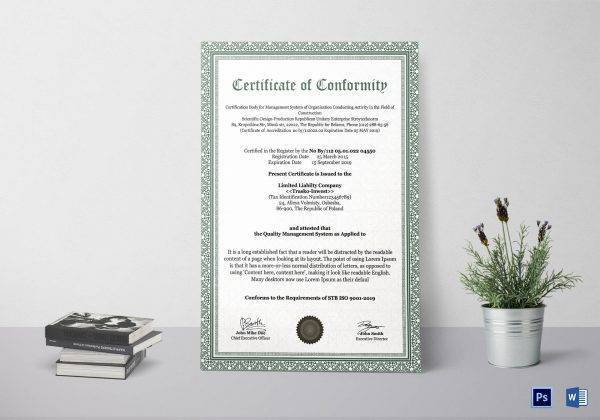
Certificate of Analysis Template

ABC Compounding General Certificate of Conformity Example
General Certificate of Conformity Defined
A General Certificate of Conformity (GCC) is a document that certifies a product’s compliance with the applicable consumer product safety rules, bans, standards, or regulations enforced by the Consumer Product Safety Commission (CPSC) in the United States. Businesses must issue a GCC for products subject to product safety regulations, and the certificate must accompany each product or shipment of products. This is also called certificate of compliance or certificate of conformity.
Key Aspects of the General Certificate of Conformity include:
The General Certificate of Conformity (GCC) is a document that certifies that a product meets all applicable consumer product safety rules, standards, bans, and regulations enforced by the Consumer Product Safety Commission (CPSC) in the United States. Here are key aspects typically included in a GCC:
- Identification of the Product: Identification of the product covered by this certificate. This clearly describes the product or products covered by the certification in detail to match the certificate to each product covered. You may also like examples of certification of participation.
- Citation of Each CPSC Product Safety Regulation: Citation to each consumer product safety regulation to which this product is being certified. The safety rule governing and applicable for each consumer product safety must be identified separately.
- Identification of the Domestic Manufacturer: Identification of the US importer or domestic manufacturer certifying compliance of the product. This presents the name, full mailing address, and telephone number of the importer or US domestic manufacturer certifying a certain product.
- Contact Information for the Individual Maintaining Records of Test Results: This pertains to the name, full mailing address, email address, and telephone number of the person who is maintaining the records of the test results.
- Date and Place where the Product was Manufactured: You must write the date or dates, at least the month and year, when the product was manufactured. Also include the place, at least the city and country, where the product was manufactured. In case the same manufacturer operates more than one location in the one city, the street address of the factory must be provided. You may also check out examples of certificate of completion.
- Date and Place where the Product was Tested for Compliance: You must also provide the location and date of the testing or the date on which certification is being based.
- Identification of Any Third-Party Laboratory: Identification of any third-party laboratory on whose testing the certificate depends. This section is usually labeled “N/A” for a General Certificate of Conformity since this is not a requirement for non-children’s products and is only included in a Children’s Product Certificate. You might be interested in training certificate examples.
In case a certifier voluntarily uses test results from a third-party laboratory, the certifier must provide the name, full mailing address, and telephone number of the third-party laboratory.
Art Supply General Certificate of Conformity Example
Bike Helmet General Certificate of Conformity Example
Cloud Alchemist General Certificate of Conformity Example
CPSIA General Certificate of Conformity Example
Purposes and Uses of the General Certificate of Conformity:
The General Certificate of Conformity (GCC) serves several important purposes and has specific uses in the manufacturing and distribution of consumer products:
- Ensuring Compliance: The GCC ensures that products comply with applicable consumer product safety rules, which helps to prevent the distribution of unsafe or non-compliant products.
- Consumer Confidence: By providing a GCC, manufacturers and importers demonstrate their commitment to safety, which can increase consumer confidence in their products.
- Facilitating Customs Clearance: The GCC is often required for customs clearance when importing goods into the United States, as it proves that the products meet U.S. safety standards.
- Record Keeping: The GCC serves as an official record that manufacturers and importers can present to demonstrate that their products have been tested and comply with relevant regulations.
- Retail and Distribution Requirements: Retailers and distributors may require a GCC before agreeing to sell or distribute a product, to ensure they are not exposing themselves to legal risks by selling non-compliant items.
- Risk Management: In the event of a product recall or safety incident, a GCC can be critical in identifying the scope of affected products and demonstrating that due diligence was exercised in the testing and certification process.
- Legal Defense: If litigation arises due to a product defect or safety issue, having a GCC can be part of a legal defense strategy to show that the product met all relevant safety standards at the time of manufacture.
- Market Access: For many products, particularly children’s products, a GCC is necessary to legally enter the market in the United States.
- Consumer Protection: Ultimately, the GCC is part of a broader system aimed at protecting consumers from the dangers of unsafe products.
Common Questions with Regard to General Certificate of Conformity
Here are the common questions asked by people with regard to General Certificate of Conformity:
1. Which products require a General Certificate of Conformity?
Here is a list of products that requires a General Certificate of Conformity.
- Architectural glazing materials
- Matchbooks
- Bicycle helmets
- CB antennas
- Power mowers
- Swimming pool slides
- Cellulose insulation
- Cigarette lighters
- Garage door openers
- Multipurpose lighters
- Bunk beds
- Furniture
- Refuse bins
- Paints and coatings
- Consumer patching compounds
- Artificial emberizing materials
- Lawn darts
- ATVs
- Pool and spa drain covers
- Portable gas containers
- Metal candle wicks
- Fireworks
- Bicycles
- Wearing apparel
- Vinyl plastic film
- Carpets and rugs
- Small mattresses
- Smoking ignition mattresses
- Open-flame ignition special packaging
- Refrigerator doors
- Drywall
2. To whom must I provide my General Certificate of Conformity?
Manufacturers or importers must furnish the General Certificate of Conformity to their distributors and retailers, and it should accompany the applicable product or shipment of products covered by the certificate. The certificate may be in the form of either an actual hard copy or a soft copy such as through a dedicated website URL that is provided on your invoice.
The federal law would also require you to provide a copy to the Consumer Product Safety Commission and to the Commissioner of Customs upon request. Ensure that the website URL for your GCC is accessible on your import paperwork for a speedier entry through Customs and Border Protection facilities. If you are traditionally printing your certificate, you can print out a hard copy and include it to your imported shipments. You may also check out salary certificate examples.
3. What if I sell directly to consumers without passing the goods to retailers or distributors?
You do not have to provide the certificate to consumers in direct-to-consumer sales as the law only requires the manufacturers to issue the certificate that accompanies the shipment of such products, requires the certificate be furnished to retailers and distributors, and requires the certificate be provided to the Consumer Product Safety Commission and to the Commissioner of Customs upon request. You might be interested in examples of certificate of appreciation.
4. What is the basis for my General Certificate of Conformity?
It must be based on a test of each product or a reasonable testing program certifying that your product, such as those listed above, passed the requirement for that certain product.
5. Does the Consumer Product Safety Commission provide a General Certificate of Conformity?
Yes. They have provided a model General Certificate of Conformity for use by manufacturers and importers.
6. Am I required to use the only the General Certificate of Conformity Form provided by the Consumer Product Safety Commission?
No, but you can copy the layout they are providing and include the necessary details of your product. You can also create your own form, such as those examples presented above, as long as it contains the necessary requirements and elements of a General Certificate of Conformity. You may also see certification templates & examples.
7. How do I identify the applicable product safety rules or other standards for my product?
You can find a lot of federal consumer product safety rules or other standards listed on the website of Consumer Product Safety Commission or other searchable database of regulated products.
8. Where must I file the General Certificate of Conformity?
It is not required to file a General Certificate of Conformity with the government for it will just accompany the shipment of the product and be furnished to distributors and retailers or to the Consumer Product Safety Commission and Commissioner of Customs upon request. You may also like certificate examples in word.
9. Can electronic certificates be used?
Yes. As previously stated, electronic certificate is allowed as long as the Consumer Product Safety Commission has access to it and it contains the necessary information and sections of a General Certificate of Conformity.
10. Do I need to change my certificate for each shipment or batch of the product?
Materiality is a factor. If each shipment of the product is materially unchanged from the prior shipment of the same product, a single certificate may be acceptable. However, the certificate must describe the coverage of the range of products. You may also check out examples of sports certificate.
11. Is a General Certificate of Conformity required for each shipment of my product?
Yes. As stated above, the law requires each shipment to be accompanied by the required certificate which applies to imports and products manufactured domestically. For electronic certificates, it is considered “accompanying” if the certificate is identified by a unique identifier and can be accessed through URL or other electronic means that are available with the shipment. You might be interested in an academic certificate.
12. Are there any penalties if I fail to comply with the General Certificate of Conformity requirement?
Yes. It is a violation of the Consumer Product Safety Act when you fail to furnish a General Certificate of Conformity. This violation of the Consumer Product Safety Act can lead to a civil penalty and criminal penalties as well as asset forfeiture, asset seizure, or confiscation of assets.
GLAS General Certificate of Conformity Example
Simple General Certificate of Conformity Example
Spray Applicator General Certificate of Conformity Example
USA General Certificate of Conformity Example
Vapor Stockroom General Certificate of Conformity Example
Statement Letter of Compliance Conformity
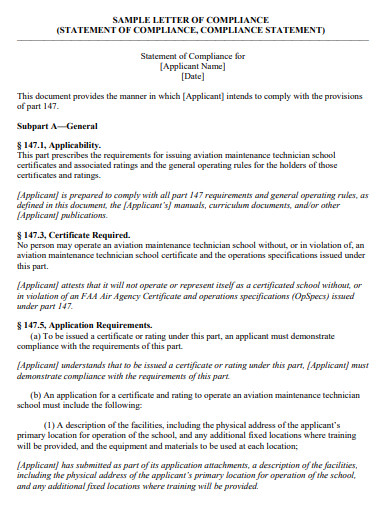
faa.gov
Certificate of Manufacturing Format
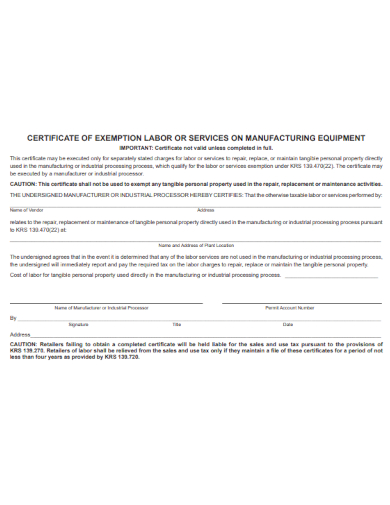
revenue.ky.gov
Product Certificate of Conformity
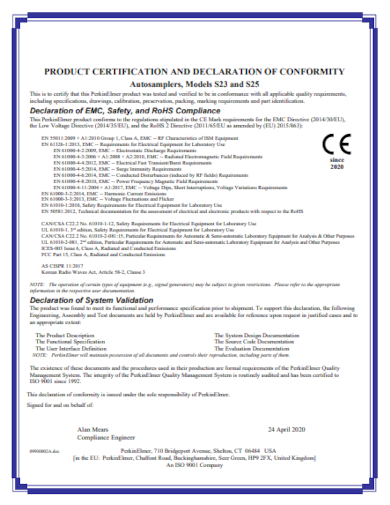
perkinelmer.com
Certificate of Safety Reliability and Compliance
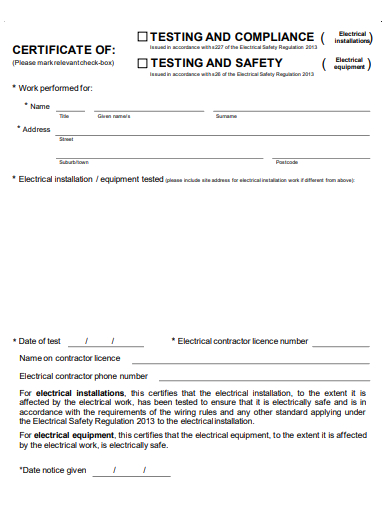
worksafe.qld.gov.au
Sample General Certificate of Conformity for Adult Clothing
The General Certificate of Conformity (GCC) plays a critical role in product safety and consumer protection. Below are continued details and considerations for GCCs:
Comprehensive Testing:
The product must undergo all necessary tests that apply to each specific safety standard it is supposed to meet. These tests must be carried out by CPSC-accepted laboratories if the regulations stipulate third-party testing. This ensures that the product does not pose any foreseeable risk to consumers under normal or reasonable foreseeable use.
Product Traceability:
The GCC allows for the traceability of products. In case a safety issue arises, it is easier to track down all the items that might be affected if they are accompanied by GCCs. This is essential for effective recalls or safety warnings.
Updating GCC:
If there are any modifications in product design, manufacturing processes, or applicable safety regulations, the GCC must be updated to reflect these changes. The certificate should always represent the current state of the product and its compliance status.
GCC Availability:
A GCC must be furnished to anyone who requests it, including retailers, distributors, and the CPSC. Typically, this means that a digital copy of the GCC is made available to download from the manufacturer’s or importer’s website. It must be available for inspection by the CPSC during any reasonable time.
International Implications:
For importers, a GCC is particularly important as it is a declaration that their products, manufactured outside the U.S., meet American safety standards. Without this certificate, products may be held at the border, rejected, or destroyed.
Risk of Non-Compliance:
Non-compliance with the GCC requirements can result in significant consequences. The CPSC can impose civil penalties, and these fines can be substantial. More severe cases, especially those involving willful neglect or false certification, can result in criminal penalties.
Legal Responsibility:
The responsibility for issuing a GCC falls on the manufacturer or importer of the products. It is their legal duty to ensure that each batch, lot, or consignment of products has a GCC and that the GCC is accurate.
Distributor and Retailer Responsibilities:
While distributors and retailers are not responsible for creating a GCC, they are required to ensure that the products they sell are covered by one. They must exercise due diligence in verifying the existence of GCCs and maintaining a copy of them.
Consumer Accessibility:
Although GCCs are not typically provided to consumers directly, they must feel confident that the products they are purchasing are safe and compliant. In this regard, a GCC represents a commitment by manufacturers and importers to adhere to safety standards designed to protect the end-user.
Best Practices for Businesses:
To maintain compliance, businesses should conduct regular audits of their GCCs, ensuring each certificate is up-to-date and readily available. Training staff on regulatory compliance and the importance of product safety documentation, such as the GCC, is also advisable.
When is a General Certificate of Conformity required?
A General Certificate of Conformity (GCC) is required for products subject to consumer product safety rules or similar rules, bans, standards, or regulations under any law enforced by the Consumer Product Safety Commission (CPSC) in the United States. It is mandatory before these products can enter the US market.
Who must issue the General Certificate of Conformity?
The General Certificate of Conformity must be issued by the manufacturer or importer of a product. For products manufactured outside the U.S., the importer is responsible for providing the GCC. It certifies that the product meets all applicable consumer product safety rules and regulations enforced by the CPSC. You may also see award certificate examples.
How does a GCC benefit consumers?
A General Certificate of Conformity (GCC) benefits consumers by ensuring that the products they purchase meet specific safety standards established by regulatory bodies. It provides assurance that the product has been tested and assessed for potential hazards, reducing the risk of harm and enhancing overall consumer safety and confidence.
Is there a need to sign the General Certificate of Conformity?
Yes, the General Certificate of Conformity (GCC) typically needs to be signed by an authorized representative of the manufacturer or importer to certify that the product complies with all applicable safety standards. The signature confirms that the information on the certificate is accurate and that the product has undergone the required testing.
What is the Difference Between a GCC and a Children’s Product Certificate?
The General Certificate of Conformity (GCC) is for consumer products that are subject to any consumer product safety rule, whereas a Children’s Product Certificate (CPC) is specifically for children’s products, which must comply with the applicable children’s product safety rules. CPCs also require third-party testing for certification.
In summary, a General Certificate of Conformity (GCC) serves as a declaration of product compliance with safety standards, ensuring consumer trust and legal adherence. This document is vital for manufacturers and importers to confirm that their goods meet regulatory requirements, bolstering market integrity and consumer safety. For further insights into the GCC’s role in product safety, explore our comprehensive guide. Lastly, do not forget to check out the examples of General Certificate of Conformity presented above whenever you need one as a reference or basis.


